The Croitoru Lab is fully committed to a culture of belonging and an inclusive environment that attracts and retains a diverse workforce, at all levels of the organization that reflects the communities we serve. We welcome applications from racialized person, women, Indigenous persons, persons with disabilities, 2SLGBTQ+ persons, and those from diverse backgrounds and experiences.

Dr. Kenneth Croitoru joined the Division of Gastroenterology at Mount Sinai Hospital in January 2008. He completed medical school at McGill University in 1981 and then trained in internal medicine and gastroenterology from 1982-1986. He went on to do post-doctoral training as an MRC Research Fellow in Mucosal Immunology with Dr. John Bienenstock at McMaster University.

Williams has a strong interest in the field of microbiota and its impact on human health. While completing a PhD in biotechnology and microbiology in France, he examined the probiotic and nutritional potential of lactic acid bacteria present in the microbiota of a fermented cereal based food using a molecular approach. At the University of Toronto and Samuel Lunenfeld Research Institute, he is currently investigating the effect of environmental factors and genotypes on human microbiome composition in the context of the prospective cohort Genetic, Environmental Microbial (GEM) project. His projects involve multiple skills and knowledge of various scientific fields, including advanced biostatistics, human physiology, human genetics, human microbiome, and human nutrition. His main project focuses on the effect of human genetics on microbiome composition and function.

Sun-Ho is a certified Gastroenterologist MD who previously completed his GI fellowship at Asan Medical Center, South Korea. He came to Toronto to start an Advanced IBD fellowship at Mount Sinai Hospital in July 2018. His main interest is translational research in IBD. At the Croitoru lab, he has been part of the GEM project to investigate the pre-clinical state of Crohn’s disease. He has decided to pursue a PhD degree at the Institute of Medical Science, University of Toronto, under supervision of Dr. Croitoru, since January 2019 with the focus of understanding the pre-disease interaction of host genetics, gut microbiome, anti-microbial immune response, gut barrier function and subclinical inflammation as a window into the pathogenesis of Crohn’s disease. He is applying machine-learning approaches to develop an integrative multi-omics prediction model to identify individuals at higher risk of developing Crohn’s disease and to determine the key contributing microbial and metabolomic factors to CD pathogenesis.
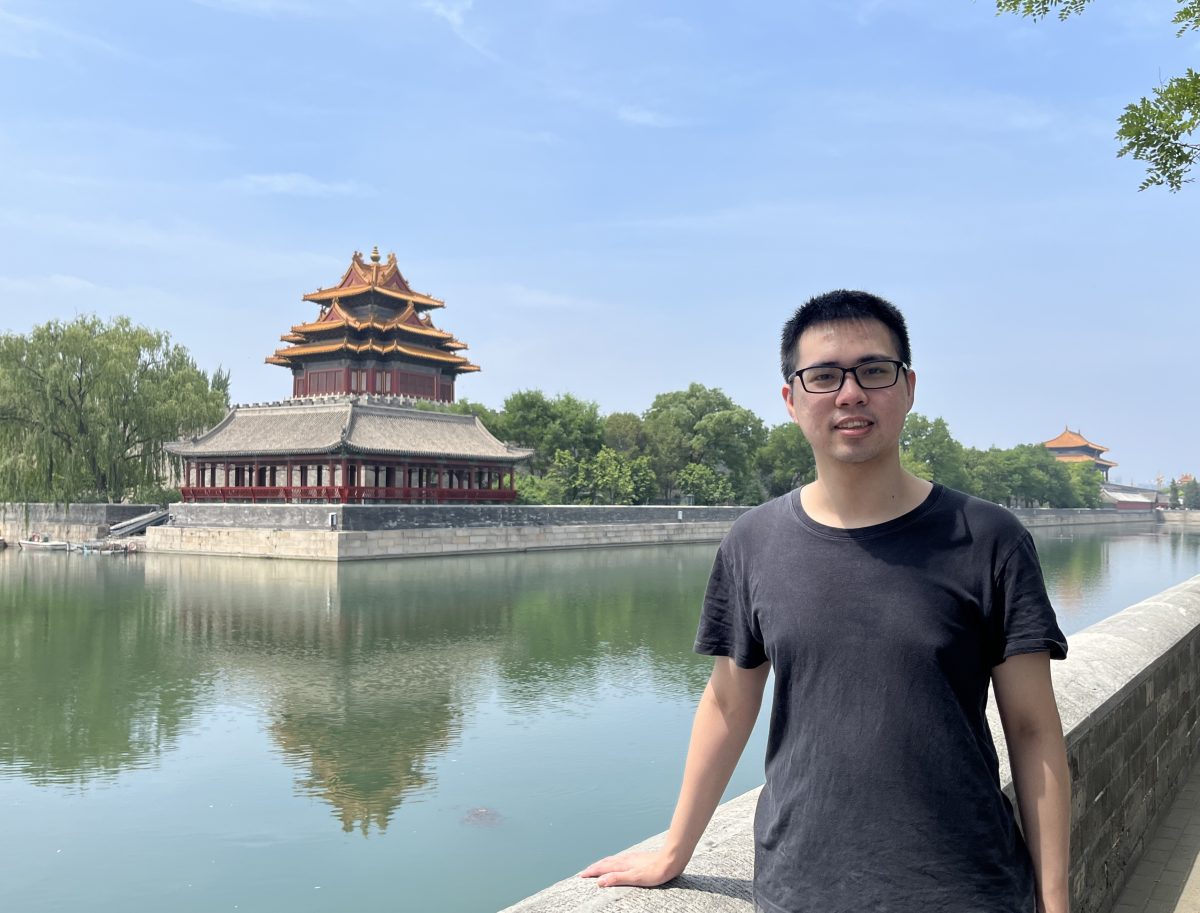
Rirong earned his medical doctor degree from Sun Yat-sen University in 2023. During his doctoral training, he performed studies to identify biomarkers for predicting disease prognosis in patients with ulcerative colitis and Crohn’s disease (CD). Since 2025, Rirong has started a postdoctoral fellowship in Mount Sinai Hospital, under the supervision of Dr. Lee and Dr. Croitoru. He is interested in leveraging multi-omics techniques on the CCC-GEM cohort to reveal biomarkers for predicting CD onset and potential targets for intercepting CD development. He is also interested in developing prediction models to identify individuals with high-risk of CD.
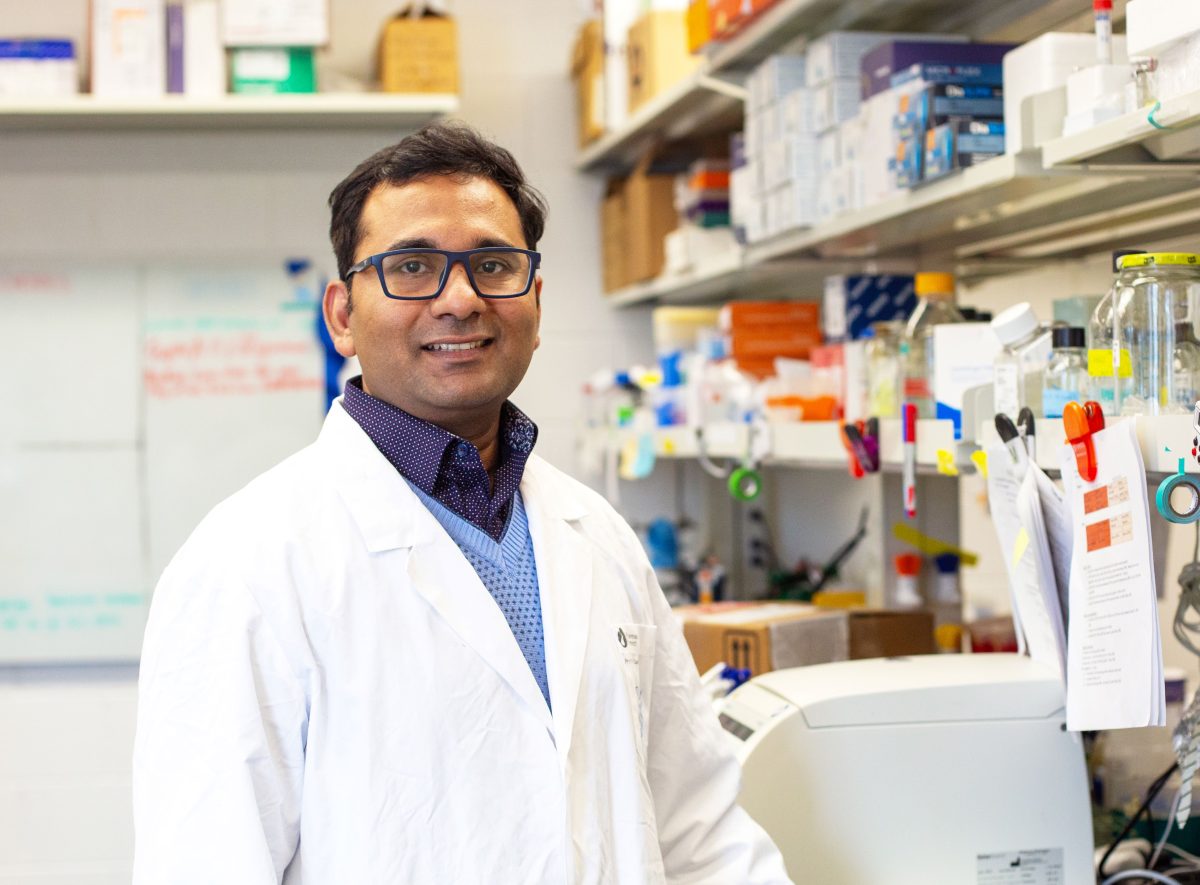
Bhupesh is deeply interested in exploring the complex interplay between host genetics, gut microbiota, the immune system, and dietary factors at the intestinal mucosa to understand the pathogenesis of gastrointestinal diseases, including colorectal cancer. His Ph.D. thesis focused on the regulation of the expression and signaling of pattern recognition receptors at the intestinal mucosa in relation to mucosal immune homeostasis and gastrointestinal infections. At the University of Toronto, he is currently investigating how gut microbiota and dietary factors interact to dysregulate mucosal immune responses, leading to gastrointestinal diseases and cancer, using both animal models and clinical samples. He also employs single-cell immunophenotyping and multi-omics data analysis to uncover immune dysregulation that precedes the clinical onset of Crohn’s disease (CD). His research aims to develop prognostic biomarkers and diet- or microbiota-based preventive and therapeutic strategies for gastrointestinal diseases.

Cong is continuing his postdoctoral training with Dr. Croitoru at the Temerty Faculty of Medicine, University of Toronto, since 2023, following the completion of his first postdoctoral fellowship at the National University of Singapore. He earned his Ph.D. in Medical Microbiology from Chulalongkorn University, Thailand. His research interests focus on exploring the reciprocal interactions between the gut microbiome and the host immune response, with a particular emphasis on uncovering the etiology of inflammatory bowel diseases.
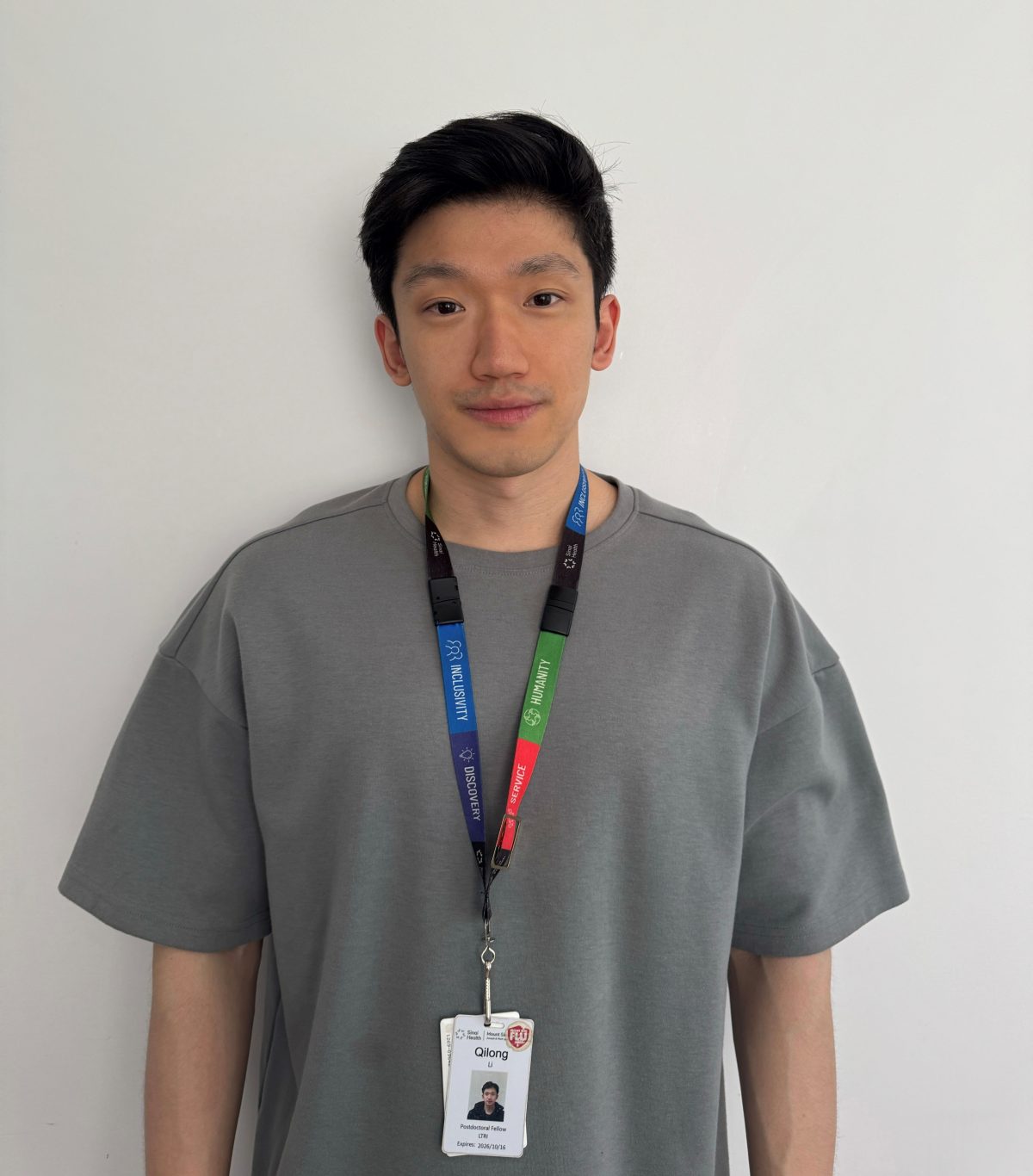
Qilong joined the Croitoru Lab in October 2023 as a postdoctoral fellow. He earned his Ph.D in Engineering from the Tokyo Institute of Technology, where he studied microbial applications. His current research focuses on shotgun metagenomic analysis to investigate microbial contributions to the risk of developing Crohn’s disease. He is skilled in bioinformatics tools for microbiome analysis and R-based statistical modeling.
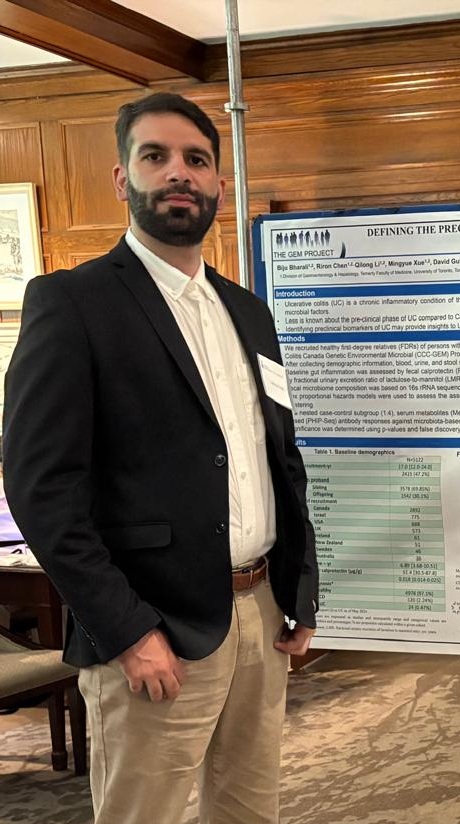
Ishfaq Shah joined the Croitoru Lab in June 2024 as a Postdoctoral Fellow. He earned his Ph.D. in Statistics from the University of Kashmir, India, where he studied count models and their applications. His current research focuses on Crohn’s disease, integrating longitudinal dietary, microbiome, and metabolomics data to uncover personalized responses. With expertise in bioinformatics and advanced statistical modeling, he also works on identifying critical transitions and tipping points using dynamic network biomarkers (DNBs) and stability models. Ishfaq is focused on developing and applying advanced statistical methods to analyze complex longitudinal data from individuals at risk of developing Crohn’s disease, including first-degree relatives, with the goal of identifying early warning signs and tailoring personalized dietary interventions to help prevent disease onset and improve long-term outcomes.


Mingyue Xue joined the Croitoru lab as a post-doctoral research fellow in 2021 after completing a PhD in Clinical Data Science in China. Her current project is part of the GEM project to investigate the pre-clinical state of Crohn’s disease. Specifically, she is developing machine learning and/or statistical approaches for multi-omics data structures to predict individuals’ risk of developing Crohn’s disease and uncover possible triggers of Crohn’s disease. She wants to collaborate with team members from different majors to improve the ability to prevent the disease from taking hold in the first place.

Isabella de Sousa has completed her first year of Biomedical Engineering undergrad at Toronto Metropolitan University, where she is the recipient of the TMU Ted Rogers Future Leader Scholarship. This summer, through the TRIANGLE CONNECT program, Isabella is working as a Summer Research Assistant with the University of Toronto’s Faculty of Medicine. Her project contributes to the GEM initiative, where she is isolating and phenotyping gut microbiota from stool samples to explore bacterial contributions to Crohn’s disease onset.
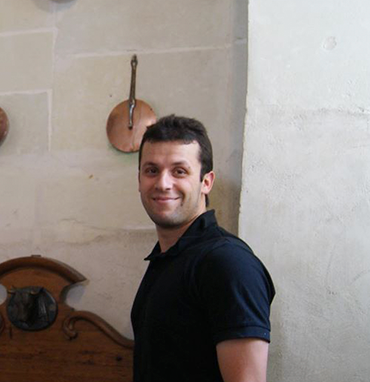
Larbi is interested in the microbiological changes that may trigger diseases in human and animals, with a focus on the interaction between host and microbiome. As a postdoctoral fellow in the Croitoru lab, he is exploring the factors that may trigger Crohn’s disease in genetically susceptible individuals. This is made possible by mining the outstanding GEM project database, which includes data on first degree relatives (FDRs) of Crohn’s disease patients. Currently, his primary focus is on studying the interaction between FDRs genetics and their microbiome using a large bioinformatics and statistical toolset.

Heather MacAulay joined the GEM Project team as a Research Assistant in 2016. She has since taken on various roles such as a Research Coordinator, Project Assistant and is currently the Project Manager for the GEM Project. In addition, she also manages other translational research studies and trials led by Dr. Ken Croitoru. She has completed an HBSc in Nutrition and Dietetics from Western University, and an HBSc in Human Kinetics from the University of Guelph.

Alireza Tavakoli has joined Dr. Croitoru’s clinical research team at Mount Sinai Hospital’s Lunenfeld-Tanenbaum Research Institute. Alireza will be assisting with the GEM project and coordinating patient recruitments and data collection for the IMAGINE and other research projects. Alireza has obtained his HBSc in Biomedical Science from York University, and his interests are in medicine and clinical research.

Cristina currently works for the GEM Project, an international research study attempting to determine possible causes for Crohn’s Disease. She began working on the project as a summer student in 2014 and returned in August 2015 as a research assistant. Her duties include reviewing the health status of individuals enrolled in the GEM Project, supporting affiliate sites across the world and general study administration. She previously obtained a BA in Biology from Williams College and a MSc in Biomedical Sciences from Tufts University.

Anna Neustaeter is a postdoctoral researcher within the Crohn’s Colitis Canada – Genes, Environment, Microbiome project, currently utilizing cohort-derived data on nutritional and biological aspects to Crohn’s disease risk. She received her MSc in animal genomics at the University of Guelph, where she performed genomic and in silico analyses of a complex adult-onset neuromuscular disorder in milk-producing cattle. Her PhD project ‘Towards Genetic Screening for Glaucoma’ was supervised by Prof. Nomdo Jansonius (head of Ophthalmology) and Prof. Harold Snieder (head of Genetic Epidemiology) at the University Medical Center, Groningen, in the Netherlands. She utilized cohort-derived biological data in creating data-driven strategies for genetic pre-screening for glaucoma, as well as improving upon self-reported glaucoma status by incorporating subjective visual experiences for questionnaire-based data. Her research interest lies in genetic and epidemiological analyses of complex disorders.
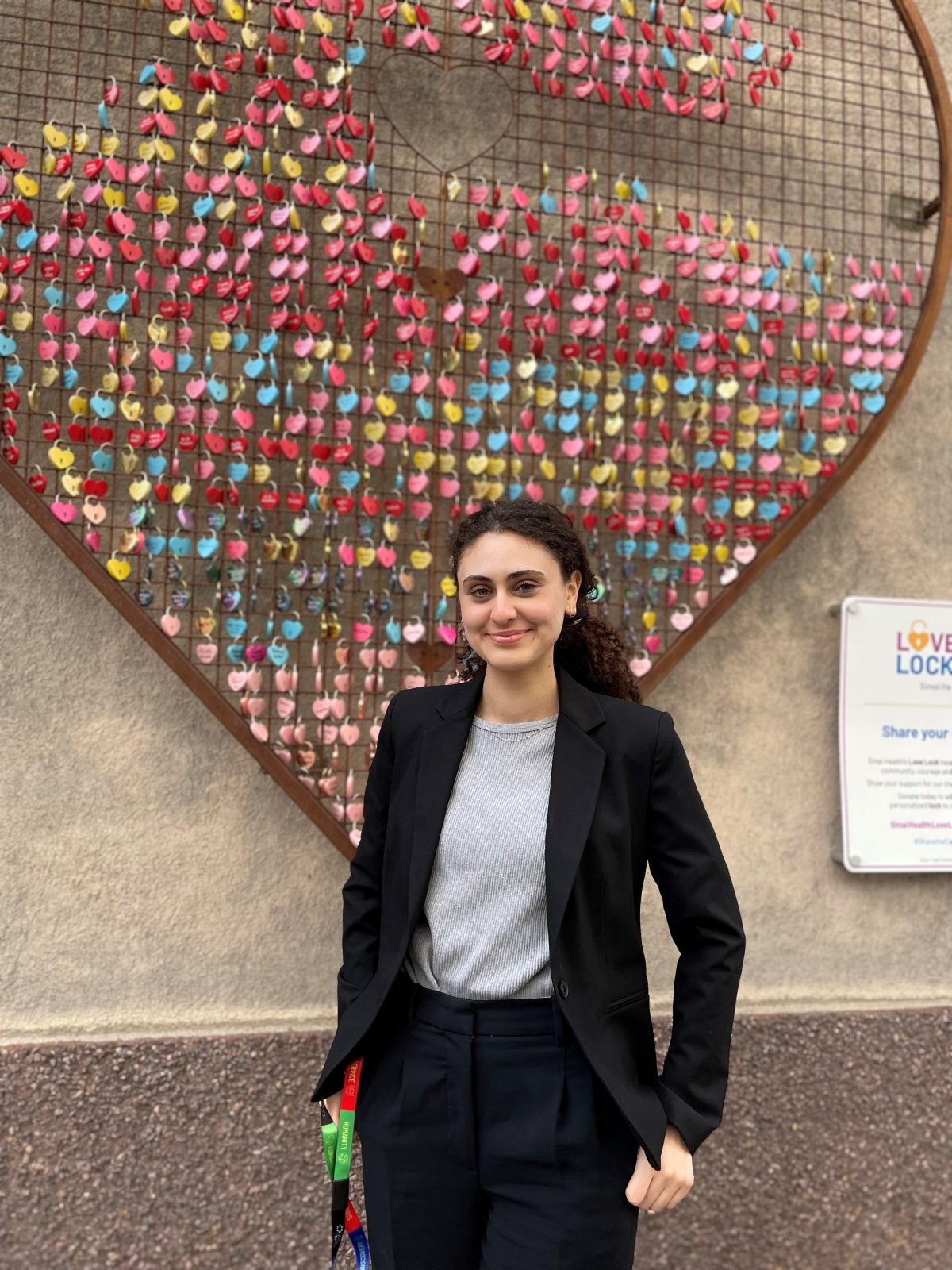
Nicole Kayrala joined the Croitoru lab as a Research Assistant. She is primarily working on the GEM (Genetics Environment and Microbiology) project. The GEM project is an international research study that aims to determine possible causes for Crohn’s Disease. Additionally, she is assisting in recruitment and specimen collection for the IMAGINE project. Assisting in determining the health outcomes for those with IBD is important to her because Canadians experience the highest rates of IBD in the world, affecting 1 in 150 Canadians. She is passionate about creating better health outcomes for those whose lives are riddled with uncertainty and perturbed by ulcerative colitis or Crohn’s disease. In 2021, she earned an Honours BSc in Biomedical science, minoring in neuroscience from the University of Ottawa

Grace joined the team in 2015 as a clinical research coordinator for both Dr. Silverberg and Dr. Croitoru. She is involved in patient recruitment, collecting biological samples and questionnaire data entry. Her favourite part of the job is interacting with patients and listening to their stories. In her spare time, Grace enjoys sleeping, baking and spending time with friends and family.

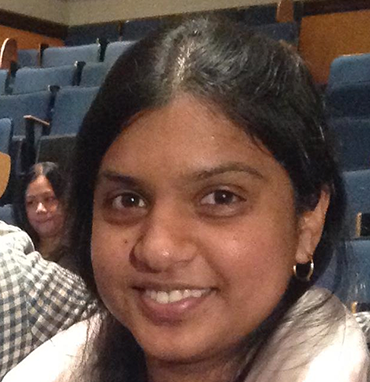
My name is Nisha Ganeswaren and I have completed my Honours Bachelor of Science from the University of Toronto pursuing a double major in Health Studies and Biochemistry. Since July 2015, I have been working as part of the Global Project Office for the GEM Project. As part of the GEM Team, we are actively involved in ensuring that study procedures are adhered at all times. Furthermore, we are actively involved in providing support to the study sites based across the world.

I am interested in the dynamic host-microbiota relationship. We cannot live without our microbes and our immune system works to distinguish symbiotic friend from pathogenic foe. How this happens, we are yet to understand. We have barely scratched the surface of understanding the complex bidirectional dependence between a host and their microbes.
My research is focused on understanding how perturbing the microbiota at different times can influence the mucosal immune system, and how this can lead to an altered susceptibility to colitis. I am interested in how the perturbation alters the bacterial community composition, the resilience of the community and how the immune system responds to the changing microbiota.

Mitra has been with Dr. Croitoru’s group since June 2011. She is currently working at the Central Processing Lab for the GEM Project at the University of Toronto. She is responsible for the preliminary processing and also managing and storing of all of the biospecimens collected by the study coordinators from sites worldwide.

MSc, Cell and Systems Biology
University of Toronto, 2013
BSc, Cellular and Molecular Biology
University of Ottawa, 2009
The relationship between our health and microbial inhabitants is poorly understood and likely to be vast in its implications with Inflammatory Bowel Disease (IBD). IBD is used to collectively describe two distinct gastrointestinal tract diseases, Crohn’s Disease and Ulcerative Colitis. We are concerned in identifying biomarkers and developing new approaches for predicting, diagnosing and treating those with Crohn’s disease. We hope these biomarkers could be applied in a noninvasive manner to improve the lives of these patients.
Currently, I am comparing the status of potential biomarkers of the gut and blood in healthy versus diseased host states. The approaches I use include immune cell phenotyping by flow cytometry on innate and adaptive immune peripheral monocytes. I am assessing T-cells driving or regulating the immune response in chronic inflammatory states, and associated intracellular markers (IL-17a, TNF, and IFNg). Furthermore, we are interested in a unique innate T-cell subset, MAIT cells, which have been shown to be present in mucosal T-cells and react to microbial derived products.




